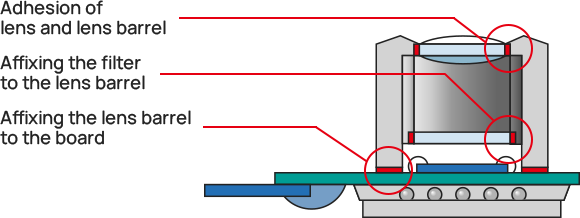PLENSETTM
Low temperature curing type

What is the PLENSETTM Low temperature curing type?
PLENSETTM Low temperature curing type is an innovative one-component epoxy resin
adhesive unparalleled in the market, capable of curing at the extremely low temperature of 60℃ in just 30 minutes.
This superior low-temperature curing characteristic makes it ideal for bonding heat-sensitive plastics, optical
components, and lenses, ensuring a wide range of applications across various environments.
Furthermore, the
PLENSETTM Low temperature curing type boasts a low cure shrinkage rate and a low coefficient of
expansion, resulting in minimal post-cure distortion. This feature makes it
exceptionally effective for bonding components and devices that require high precision.
PLENSETTM
Low temperature curing type can be tailored to various application methods. It can be adapted for point
dispensing, line dispensing, and full-surface dispensing, thereby enhancing the design flexibility of products and
achieving improved efficiency and accuracy in manufacturing processes.
It can achieve fast curing through medium-to-high temperature heating, simplifying the in-line
curing process. This capability boosts the throughput of production lines and maximizes production efficiency. An
efficient curing process maintains high product quality while supporting customers in reducing manufacturing costs
and delivering products in a timely manner, thereby contributing to solving customer challenges.
Have you experienced these issues?
Here is the product that resolves these issues. PLENSETTM Low temperature curing type
Application
Assembly of camera modules for mobile devices
Adhesion around optical
lens
Adhesion to engineering plastics
Assembly and adhesion of heat-sensitive and precision parts

te
| Item | AE-901B | AE-901T-DA | Conditions | ||
|---|---|---|---|---|---|
| Characteristics | Color tone and appearance | Black viscous liquid | Black viscous liquid | Visual inspection | |
| Viscosity | 60Pa・s | 17Pa・s | E-type viscometer 25degC,20rpm | ||
| Thixotropic index | 1.1 | 2.0 | E-type viscometer 25degC,2rpm/20rpm | ||
| Gel time | 120seconds/80degC | 100seconds/80degC | Hot plate | ||
| Standard curing conditions | 60degC×30minutes | 60degC×30minutes | Hot air circulation oven | ||
| Properties of cured materials | Tensile lap shear strength | 16N/㎟ | 17N/㎟ | Mild steel plate | |
| 2.7N/㎟ | 3.4N/㎟ | Polycarbonate | |||
| Glass transition temperature | 55degC | 44degC | TMA measurement | ||
| Thermal expansion coefficient | α1 | 50ppm | 60ppm | ||
| α2 | 80ppm | 150ppm | |||















